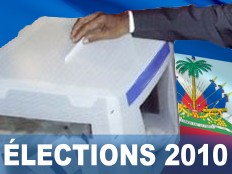|
||||||||||||||||||
| Download the revised decree and electoral calendar, published in the official journal |
|
|
Haiti - Elections : The presidential race most expensive in the history of Haiti 12/09/2010 14:59:13
The experts estimated that between 3 and 6 million of dollars ($us) the amounts needed [by candidate] to conduct their electoral campaigns, a challenge that will be difficult to overcome for many candidates. Political analysts for their part, believe that the budget could reach between 10 and 20 million of dollars for the best candidates. The presidential race in this context, could be the most expensive in the history of Haiti for candidates. Haiti was already expensive before the quake, but when the campaign will start all prices will explode, the demand exceeds supply. Experts said the presidential and legislative elections could very well become an engine of economic recovery, stressing that the candidates campaigns will generate tens of thousands of jobs. Leslie Voltaire, the candidate, who plans to hire 10,000 observers ($20 per person and per day). It is also considering hiring a helicopter ($750 per hour) to move into areas difficult to access. He estimates it will take between six and eight million dollars to finance his campaign. He has spent three days in Florida trying to raise funds in the diaspora "that costs are outrageous [...] fortunately that there are people ready to subsidize them". A campaign budget that includes a barebones minimum visibility, billboards, advertising in local newspapers ($ $1,000 a color page, $450 in black and white), audio broadcasts of spots, 30 seconds (between $60 and $100 per diffusion), T shirts ($29 to $35 per dozen) and posters, already represent an amount of $1 million, excluding costs of production, vehicles, fuel, food etc ... [for memory at the time of the campaign of 2006, Rene préval had made distribute nearly 1.5 million Tee-shirts] "The vehicles are hard to find in Haiti [mainly because of the pressure exerted by the needs of humanitarian] rentals, when available, increased from $150 to $250 per day" said Senator Joseph Lambert, National Coordinator for INITE adding that it is cheaper to buy vehicles for the campaign than renting. Should still be able to do when you know that a small Ford which sold $30,000 before the earthquake is now found less than $40,000 ! But transportation is not the only significant cost, said the Senator. It must also include the costs of providing electricity and food at campaign rallies, "The people are hungry, you can not now simply invite them to come to a meeting and not feeding [...] it is extremely expensive". Lambert refused to talk about the cost of the campaign INITE but assures that funding will be made from funds from the private sector. Stating that he and other senators will be aware that departmental funds are not used to finance candidates, deploring the practice. Steven Benoit, a former deputy, doubt "with the absence of a functioning parliament, it will be difficult to monitor illegal expenditures" worried about the recent decisions of Mr. Preval to withdraw $100 million from the fund PetroCaribe for the roads, and could end up in the funding of its candidates". I am convinced that this money will be used in elections to buy votes". It is known that government agencies in the past have been used as "black boxes" and pay campaign expenses, a practice forbidden and illegal, but rarely reported. Given the number of former government officials among the candidates we do not know if someone will receive public funds other than what the government plans officially. The financing of the campaigns inevitably raise another concern, the use of the benefit of drug trafficking, the ransoms of removals and other money badly acquired with an aim of supporting candidates, of buying voices or of financing social disorders. "The role of the organized crime is a great subject of concern, we fear that traffickers benefit from the countryside to try to have an influence on politicians" declared Mark Schneider, an expert in Haiti of "Washington International Crisis Group". The international experts point out that the electoral bodies have no capacity to effectively monitor campaign finance. It is to be feared, unfortunately, that beyond qualities of the candidates, it is the candidate who will have more financial means which will be likely greatest chance of winning. S / HaitiLibre
|
|
|
Why HaitiLibre ? |
Contact us |
Français
Copyright © 2010 - 2026 Haitilibre.com |





